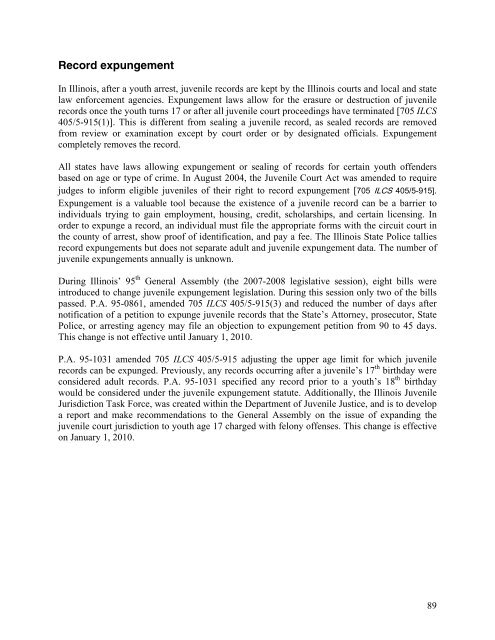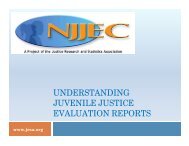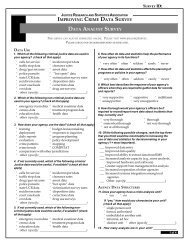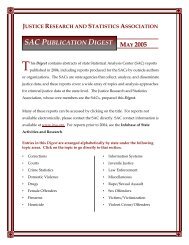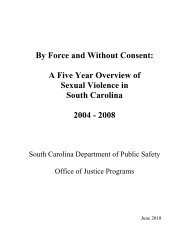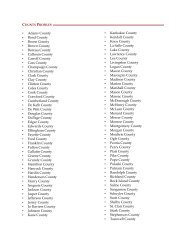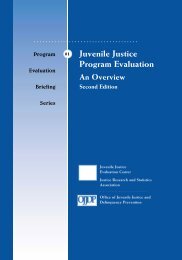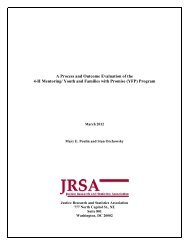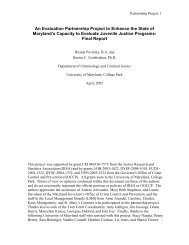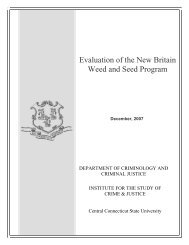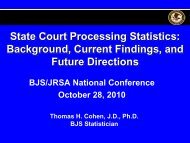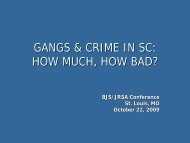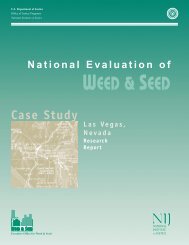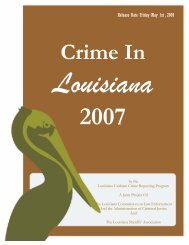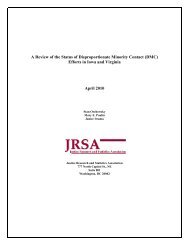Juvenile Justice System and Risk Factor Data - Illinois Criminal ...
Juvenile Justice System and Risk Factor Data - Illinois Criminal ...
Juvenile Justice System and Risk Factor Data - Illinois Criminal ...
You also want an ePaper? Increase the reach of your titles
YUMPU automatically turns print PDFs into web optimized ePapers that Google loves.
Record expungement<br />
In <strong>Illinois</strong>, after a youth arrest, juvenile records are kept by the <strong>Illinois</strong> courts <strong>and</strong> local <strong>and</strong> state<br />
law enforcement agencies. Expungement laws allow for the erasure or destruction of juvenile<br />
records once the youth turns 17 or after all juvenile court proceedings have terminated [705 ILCS<br />
405/5-915(1)]. This is different from sealing a juvenile record, as sealed records are removed<br />
from review or examination except by court order or by designated officials. Expungement<br />
completely removes the record.<br />
All states have laws allowing expungement or sealing of records for certain youth offenders<br />
based on age or type of crime. In August 2004, the <strong>Juvenile</strong> Court Act was amended to require<br />
judges to inform eligible juveniles of their right to record expungement [705 ILCS 405/5-915].<br />
Expungement is a valuable tool because the existence of a juvenile record can be a barrier to<br />
individuals trying to gain employment, housing, credit, scholarships, <strong>and</strong> certain licensing. In<br />
order to expunge a record, an individual must file the appropriate forms with the circuit court in<br />
the county of arrest, show proof of identification, <strong>and</strong> pay a fee. The <strong>Illinois</strong> State Police tallies<br />
record expungements but does not separate adult <strong>and</strong> juvenile expungement data. The number of<br />
juvenile expungements annually is unknown.<br />
During <strong>Illinois</strong>’ 95 th General Assembly (the 2007-2008 legislative session), eight bills were<br />
introduced to change juvenile expungement legislation. During this session only two of the bills<br />
passed. P.A. 95-0861, amended 705 ILCS 405/5-915(3) <strong>and</strong> reduced the number of days after<br />
notification of a petition to expunge juvenile records that the State’s Attorney, prosecutor, State<br />
Police, or arresting agency may file an objection to expungement petition from 90 to 45 days.<br />
This change is not effective until January 1, 2010.<br />
P.A. 95-1031 amended 705 ILCS 405/5-915 adjusting the upper age limit for which juvenile<br />
records can be expunged. Previously, any records occurring after a juvenile’s 17 th birthday were<br />
considered adult records. P.A. 95-1031 specified any record prior to a youth’s 18 th birthday<br />
would be considered under the juvenile expungement statute. Additionally, the <strong>Illinois</strong> <strong>Juvenile</strong><br />
Jurisdiction Task Force, was created within the Department of <strong>Juvenile</strong> <strong>Justice</strong>, <strong>and</strong> is to develop<br />
a report <strong>and</strong> make recommendations to the General Assembly on the issue of exp<strong>and</strong>ing the<br />
juvenile court jurisdiction to youth age 17 charged with felony offenses. This change is effective<br />
on January 1, 2010.<br />
89


